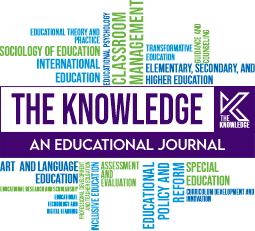Peace and Value Education Policy Perspectives in The Context Of India
DOI:
https://doi.org/10.63062/tk/2k23a.21104Keywords:
India, Education, Culture, Peace, Indian Education PolicyAbstract
Education must be autonomous for development. Cultural and ethical aspects of education are often overlooked due to the focus on economics in capitalist development. A lack of awareness of these realities impacts society significantly. Bringing in the behavior scale is necessary. Inculcate the idea that education for development fosters a commitment to global solidarity, peace, justice, and environmental awareness in youth. It aims to enable children and youth to contribute to positive development locally and worldwide. Based on the foregoing realities, peace and value education are pioneering initiatives that require vision and determination. A brief attempt may diminish its effectiveness and increase cynicism. Humans can become sophisticated destroyers of themselves and life on earth through education. Education alone is essential for citizens to live peacefully and with dignity. In this research, we emphasize the significance of value and peace education in policy formulation and implementation. Libraries will be used in this two-part research. The first section of this study discussed the significance of peace and value education at the national level. The second portion contains recommendations and suggestions for implementing peace and value education in Indian policy and related publications.
References
Agarwal, P. (2012). A half-century of Indian higher education: Essays by Philip G Altbach. Sage Publications Pvt.
Ahmad, I., Ur Rehman, K., Ali, A., Khan, I., & Khan, F. A. (2014). Critical analysis of the problems of education in Pakistan: Possible solutions. International Journal of Evaluation and Research in Education (IJERE), 3(2). https://doi.org/10.11591/ijere.v3i2.1805
Bashir, S., & Akbar, R. A. (2021). Determining the Effect of Peace Education on Knowledge and Attitude of Prospective Teachers: An Experimental Study. Bulletin of Education and Research, 43(3), 47-66.
Brooks, S. G., & Wohlforth, W. C. (2000). Power, Globalization, and the End of the Cold War: Reevaluating a Landmark Case for Ideas. International Security, 25(3), 5–53. http://www.jstor.org/stable/2626705
Ghosh, C. S. (1983). Formation of an educational policy of the British Raj between 1757 and 1857. L’offre d’école, 43-63. https://doi.org/10.4000/books.psorbonne.82327
Farrelly, T. M. (1993). A New Approach to Moral Education: The Integrated Character Education Model. Journal of Correctional Education, 44(2), 76–82. http://www.jstor.org/stable/41970957
Hatami, H., Hatami, M., & Hatami, N. (2012). The religious and social principles of patients’ rights are in the Holy books (Avesta, Torah, Bible, and Quran) and in traditional medicine. Journal of Religion & Health, 52(1), 223–234. https://doi.org/10.1007/s10943-012-9619-4
Jain, C. (2018). National Curriculum Framework 2005 and the English curriculum. Motifs: An International Journal of English Studies, 4(1and2), 5. https://doi.org/10.5958/2454-1753.2018.00002.8
Lansdown, G., Covell, K., & Vaghri, Z. (2022). Article 29: The aims of education. In Children’s well-being (pp. 261–270). https://doi.org/10.1007/978-3-030-84647-3_27
Mitchell, T. (2022, September 19). Religion in India: Tolerance and segregation. Pew Research Center's Religion & Public Life Project. https://www.pewresearch.org/religion/2021/06/29/religion-in-india-tolerance-and-segregation/
Ntlama, N. (2017). The foundations of “peace” as a value for the promotion of human rights in Africa. African Human Rights Law Journal, 17(1), 55–67. https://doi.org/10.17159/1996-2096/2017/v17n1a3
Okoye, K., Haruna, H., Arrona‐Palacios, A., Quintero, H. N., Ortega, L. O. P., Sanchez, A. L., Ortiz, E. A., Escamilla, J., & Hosseini, S. (2022). Impact of digital technologies upon teaching and learning in higher education in Latin America: an outlook on the reach, barriers, and bottlenecks. Education and Information Technologies, 28(2), 2291–2360. https://doi.org/10.1007/s10639-022-11214-1
Poornima, M. (2020). Kothari Commission Report (1964–66). Vision of Education in India, 108-125. https://doi.org/10.4324/9781003124306-8
Reingold, N. (1995). Choosing the Future: The U.S. Research Community, 1944-1946. Historical Studies in the Physical and Biological Sciences, 25(2), 301–328. https://doi.org/10.2307/27757747
Reliefweb. (2018, December 28). The world failed to protect children in conflict in 2018: UNICEF. ReliefWeb. https://reliefweb.int/report/world/world-has-failed-protect-children-conflict-2018-unicef
Sangia, R. A.(2018). National curriculum 2013: From literacy to scientific approach. https://doi.org/10.31219/osf.io/9u6a3
Standish, K., Devere, H., Suazo, A. E., & Rafferty, R. (2021). Defining the platform of positive peace. In Springer eBooks (pp. 3–24). https://doi.org/10.1007/978-981-16-0969-5_1
Wright, S. (2022). On the role of education in national cultural identity. Journal of Educational Research and Policies, 4(6). https://doi.org/10.53469/jerp.2022.04(06).28



